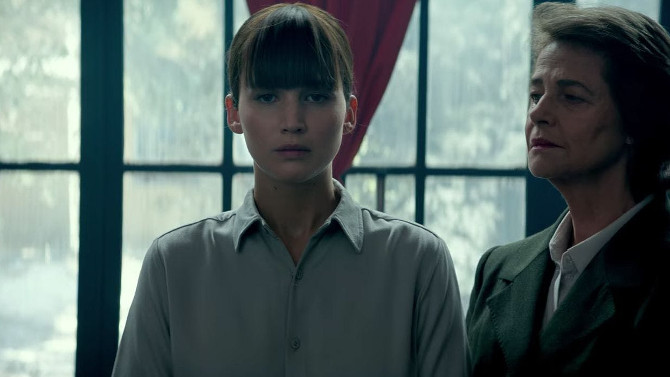
Seeing Red
If it was ever possible for a film to be of the wrong time as well as utterly relevant for its time, Francis Lawrence’s Red Sparrow would be it. Like a hybrid of a 1970's B exploitation pic and Italian giallo thriller (it relishing in its moments of sadism, violence and nudity), at the same moment, it is a worthwhile vehicle for its female lead. Dealing with topics such as rape, revenge, retribution, and politics, its old-school style story-telling (with twenty-first century glossy filter) has likely pushed it to the fringes – with such issues ripping through Hollywood and American politics itself, it may be too close to home for many to enjoy. A motion picture that would have thrived on the drive-in circuit back in the day, it is a twisty (and twisted) Machiavellian tale of spy-craft and game-playing. . . a dog eat dog, cutthroat world. Led by a daring performance from Jennifer Lawrence (reuniting with her Hunger Games director – that is, of films two, three, and four), she plays Dominika Egorova, a prima ballerina in Russia. After a horrible injury, she is left in a precarious position, as she does not have the money to support herself or her sickly mother, Nina (Joely Richardson).

Oscar Predictions 2018
Predicted winners, who should win, and my favourites from this year's Oscars (the 90th Academy Awards). Catch up on all of the buzz before the big event.
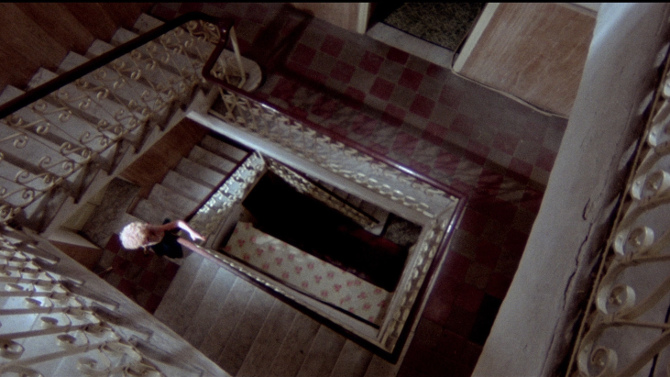
A Case of Corruption – Milano Style
Combining two of the most fascinating Italian genres of the 1970s, giallo and poliziotteschi (that is, thriller and crime/action), 1975's The Suspicious Death of a Minor (also known as Too Young to Die) uses more subtle strokes of violence and nudity compared to many other giallo features from the time, instead building suspense and energy by way of highly original set pieces. Directed by Sergio Martino (this is his sixth and final giallo, another example being Your Vice Is a Locked Room and Only I Have the Key), he introduces us to the picturesque yet dangerous world of Milan, circa 1975 – a place where we find a young prostitute named Marisa (Patrizia Castaldi) on the run from an unsettling figure in mirrored glasses. Attempting to meet with undercover detective, Paolo Germi (Claudio Cassinelli – the actor sadly died in a helicopter crash while filming another Martino picture – 1986's Hands of Steel), she is eliminated by the stone cold proficient assassin before being able to pass on any actionable information.
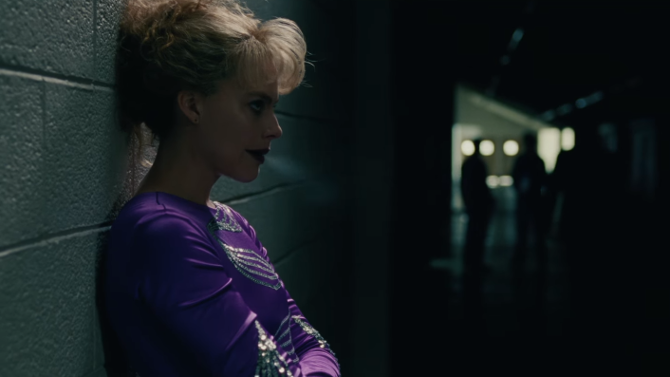
Spinning a Tale
Like landing a triple axel, figuratively speaking, I, Tonya writer Steven Rogers and director Craig Gillespie (Lars and the Real Girl) conquer the difficult feat of bringing the complicated career of figure skater Tonya Harding to vivid life on the big screen. Relishing in the ‘perception of truth’, Rogers and Gillespie develop a bio-pic mockumentary style approach, each character having their own version of the story. Complex in its narrative direction, multiple persons have their say, sometimes breaking the fourth wall and talking directly to the audience – at one point, Harding (Margot Robbie – Academy Award nominee for Best Lead Actress), gun in hand, makes it quite clear that this portion of the tale never actually happened – a rebuttal to her husband, Jeff Gillooly (Sebastian Stan), and his unflattering perspective.
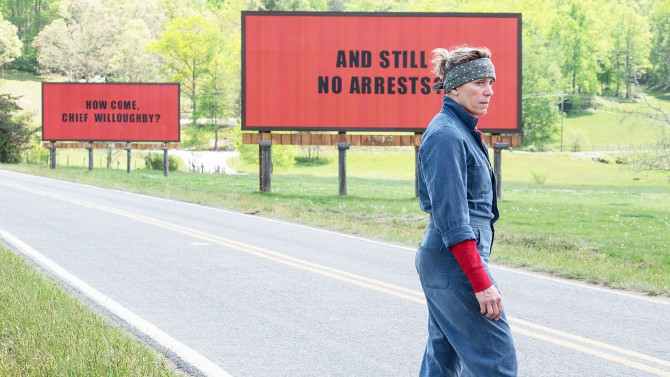
Advertising Gets Results?
Good things come in threes – case in point, Martin McDonagh’s Three Billboards Outside Ebbing, Missouri. His third full length feature, it has earned him his first Best Picture nomination at the Academy Awards (expected to be one of the frontrunners this year), while the motion picture has also garnered its three main performers Best Actress/Supporting Actor nods, and, though it may be a tad of a stretch, when eliminating the four above mentioned Oscar nominations, it has also earned three other chances for the elusive statuette (for Original Score – Carter’s Burwell’s composition brimming with mysterious western melancholy; Original Screenplay; and Film Editing). Interestingly, the film could very well have had another title, “Three Letters from a Sheriff in Ebbing, Missouri” – but more on that later. Bringing to life another fascinating dark premise, McDonagh scribes a heart-wrenching tale of how human beings deal with anger, loss, hate, guilt, grief, injustice, and the seemingly cruel fate of life, yet, as always, combined with his sharp wit – a rare movie that, despite its pitch black subject matter, will have you laughing on and off throughout, much like his earlier gems, 2008's In Bruges and 2012's Seven Psychopaths.
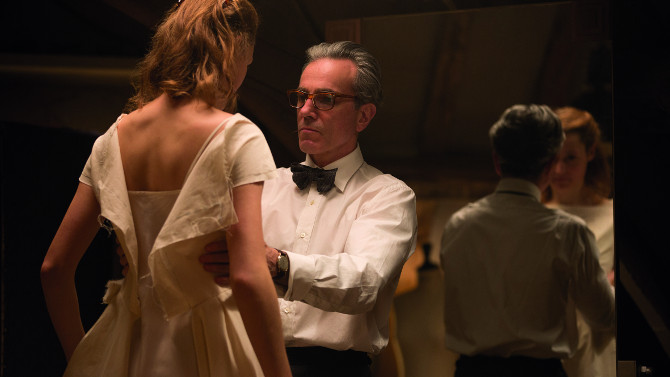
What a Tangled Web We Weave. . .
Perhaps the end of something very special. . . that is, if Daniel Day-Lewis does follow through and retire from acting after his most recent lauded performance in Paul Thomas Anderson’s Academy Award Best Picture nominee Phantom Thread. It is this nuanced role that will bookend a career that has consisted of six deserving nominations and three well earned Oscars (four, if he wins this year). At the heart of this tale of gothic romance (Anderson’s narrative and classic visual aesthetic reminiscent of movies like Rebecca), Reynolds Woodcock (Day-Lewis) is a renowned dressmaker (circa the 1950s), a man who, like his flawlessly tailored clothing (he hides secrets in the work), expects everything to be just perfect. He is peculiar in his cleanliness and rigidity – every hair in its place, absolute quiet at breakfast (his entire day ruined if his stringent routine interrupted). . . obsessive in every which way, including in that he is still haunted by the death of his mother. An example of this fiefdom of rules and attitude – after tea is brought to him at the wrong time, he exasperatingly exclaims, “the tea is going out; the interruption is staying right here with me”.
